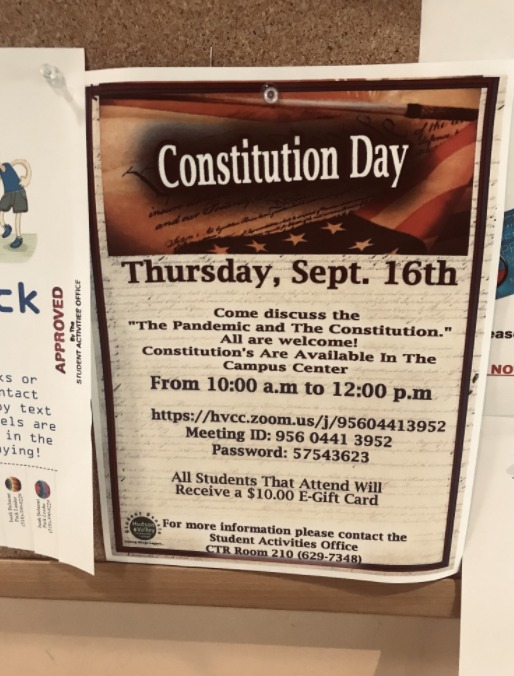Constitution Day Focuses On COVID Safety Laws

By Connor Danz, Creative Editor
On September 16th, 2021, Professor Alan Joseph and Professor Robert Whitaker hosted Hudson Valley’s annual “Constitution Day.” This takes place every year to honor the national holiday which is celebrated on September 17th. This date was specifically chosen by Congress in the 1940s because it was the day all of the delegates came together during the founding to do a final vote on the finished product that we call the Constitution today.
To commemorate this day, Joseph and Whitaker held a panel that is open for discussion for both facility and staff to attend, ask questions and partake in a conversation about the constitution in our times. Due to the pandemic, last year’s event had to be canceled but this year’s event was still able to happen via a Zoom meeting.
This year’s discussion was a wonderful exchange about the constitution in the current pandemic and some of the actions taking place at the federal level. Special attention was paid to upcoming Supreme Court cases and the resurgence of the 10th amendment over the last 40 years.
After the event, Professors Joseph and Whittaker took questions from the audience. One student asked about a recent Supreme Court case involving a church in Nevada that sued the state over COVID-19 regulations, alleging that casinos in the state received fewer regulations than religious institutions did.
The lawsuit claimed that the state of Nevada favored the rights of casino owners as their businesses provided more revenue for the state than churches did. Despite this, the Court ruled against the church. All four liberal judges at the time ruled against the church, with conservative appointed Chief Justice John Roberts being the deciding vote.
Professor Whittaker said there was very little precedent to this case, as the Supreme Court is usually very sensitive to the concerns of religious individuals. Whittaker also pointed out that the case was decided over the summer of 2020 when Justice Ruth Bader Ginsburg was a deciding vote on the Court at the time. Ginsberg has since passed and been replaced by Justice Amy Coney Barrett. A new case involving the state of California has rendered previous cases irrelevant.
Another student asked about President Biden’s recent attempts to sign into law an Executive Order that would mandate workers at private and public companies with over 100 employees test their workers weekly or require them to be vaccinated, which is something many Republican governors have objected to and are now suing over.
Professor Joseph said it will be interesting to see how those cases play out, given that the law was an executive order signed by Biden, rather than a bill passed by Congress and signed into law by the president.
Whittaker also talked about previous cases involving vaccine mandates in America. He discussed an early case from the early 1800s in which an American citizen opposed to the smallpox vaccine objected to local mandates. The U.S. Supreme Court case determined that he had to comply with local vaccine requirements. Joseph and Whittaker both also pointed out that scientists determined the smallpox vaccine was not completely safe at the time.
